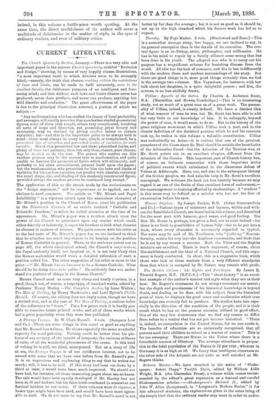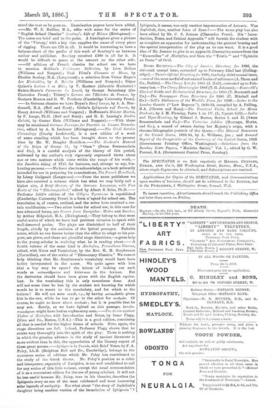Selmer., Booxs.—We have received in the series of "Shake- speare
: Select Plays," Twelfth Night, edited by William Aldis Wright, M.A. (the Clarendon Press), a volume whicl comes recom- mended by the editor's great reputation as a learned and careful Shakespearian scholar.—Shakespeare's Richard IL, edited by John W. Allen (Longmans), in " Longman's Modern Series," is for less advanced students, the explanations given in the notes being of the simple kind that the ordinary reader may want in order to under- stand the text as be goes on. Examination papers have been added. —Mr. W. E. Mullins, M.A., edits with notes for the series of "English School Classics" Southey's Life of Nelson (Rivingtons).— The notes are brief and to the point. A frontispiece gives a picture of the ` Victory,' with a key that supplies the name of every piece of rigging. There are 178 in all. It would be interesting to have a balance-sheet of the profits of this work of Southey's as between author and publisher. Southey received £300 in all for it. It would be difficult to guess at the amount on the other side. —Of editions of French classics for school use we have to mention Molibre's Prdcieuses Ridicules, by Leon Delbos (Williams and Norgate) ; Paul Fevers Chouans et Bleus, by Charles Sankey, M.A. (Longmans) ; a selection from Victor Hugo's Les Miserables, by J. Boi,lle (Williams and Norgate) ; Edgar Quint's Lettres a sa Mere, by V. Kastner (Librairie Hachette) ; Sainte-Benve's Causeries du Lundi, by George Saintsbary (the Clarendon Press) ; Thierry's Lettres sur r Histoire de France, by Gustave Masson and G. W. Prothero (Cambridge University Press). —In German classics we have Heyse's Hauf Lange, by A. A. Mac- donnell, M.A. (Bell and Sons) ; GOthe's Iphigenia auf Tauris, by Henry Attwell (Williams and Norgate) ; Hoffmann's Meister Martin, by F. Lange, Ph.D. (Bell and Sons) ; and G. E. Lessing's Emilia Galotti, by Gustav Hein (Williams and Norgate).—With these may be mentioned German Passages for Practice in Unseen Transla- tion, edited by A. R. Leohmer (Rivingtons).—The Civil Service Chronology (Crosby Lockwood), is a new edition of a work of some standing which has been brought down to the present time by Mr. W. Douglas Hamilton.—The Student's Manual of the Reign of George Jr., by " Oxon " (Swan Sonnenschein and Co.), is a careful analysis of the history of this period, enlivened by the author's very vigorously expressed views about one or two matters which come within the range of his work,— the Jacobite rising of 1745, for instance, and, strange to say, fox- hunting parsons.—We have also to acknowledge, as a book primarily intended for use in preparing for examinations, The French Handbook, by Loony Guilgault (Lougmans).—From the same publishers we have also received a volume which has what we may fairly call a higher aim, A Brief History of the German Language, with Five Books of the "Nibelungenlied," edited by Albert S. Selss, Ph.D.- Professor Jebb's edition of the Edipus Tyrannus is republished (Cambridge University Press) in a form eapted for school use. The translation is, of course, omitted, and the notes have received a cer- tain modification.—Two other books for school use, in this case for less advanced forms, are Scenes from Euripides : Medea and Bacchre, by Arthur Sidgwick, M.A. (Rivingtons).—They belong to that most useful series of which we have had previous occasion to speak with well-deserved praise. The plays are diminished to half of their length, chiefly by the omission of the lyrical passages. Suitable notes, which no one knows better than the editor to adapt to his par- pose, are given, and there are plentiful stage directious,—a great help to the young scholar in realising what he is reading abont.—A fourth volume of the same kind is .Eschylus, Prometheus Vinctus, edited, with Notes and Vocabulary, by the Rev. H. M. Stephenson (Macmillan), one of the series of "Elementary Classics." We cannot help thinking that Mr. Stephenson's vocabulary would have been better incorporated in the notes. We quite agree with him that a boy may be spared the labour of looking out such words as aeAatv‘flporros and &Ali:Provos in the lexicon. But the derivation should have been given with the English equiva- lent. In the vocabulary this is only sometimes done. And will not some time be lost by the student not knowing for which words he is to resort to the vocabulary, and for which to the lexicon ? He will not save much, e.g., by having issXaka9a0is given him in the one, while he has to go to the other for seveu&v. Of course, he ought to know about seoeuZv ; but it is possible that he may not. Surely, as we have lighted on this passage, &imolai cruinnixolcri might have had an explanatory note.—The Seven against Thebes of tEschylus, with Introduction and Notes, by Isaac Flagg. (Ginn and Co., Boston, IT.S.A.)—This is a good edition, containing all that is needed for the higher forms of schools. Hero, again, the stage directions are fall. Indeed, Professor Flagg shows that he enters very thoroughly into the spirit of the play. There is nothing in which the genuine advance iu the study of ancient literature is more evident than in this, the appreciation of the literary aspect of these great poems.—Iphigenia in Tauris, with Brief Notes, by F. A. Paley, LL.D. (Deighton Ball and Co., Cambridge), belongs to the numerous series of editions which Mr. Paley has contributed to the study of the Greek drama. Mr. Paley's position as a critic and interpreter, especially of Euripides, is too well established to call for any notice of this little volume, except the usual commendation of it as a convenient edition for the use of young scholars. It will not be less useful because Mr. Paley, true to his theories, describes the Iphigenia story as one of the most celebrated and most harrowing solar legends of antiquity. But what about "the story of Jephtbah's daughter being another version of the immolation of Iphigenia " ? Iphigenia, it seems, was only another impersonation of Artemis. Was Jephthah, then, another form of Zeus ?--The same play has also been edited by Mr. C. S. Jerram (Clarendon Press). His " Intro- duction, Notes, and Critical Appendix" will furnish the student with as complete an apparatus for understanding the general bearing and the special interpretation of the play as he can want. It is a good idea of Mr. Jerram to give in an appendix illustrative scenes from the " Eumenides" of Aschylas, and from the " Tristia " and "Epistolte ex Ponto" of Ovid.



































 Previous page
Previous page